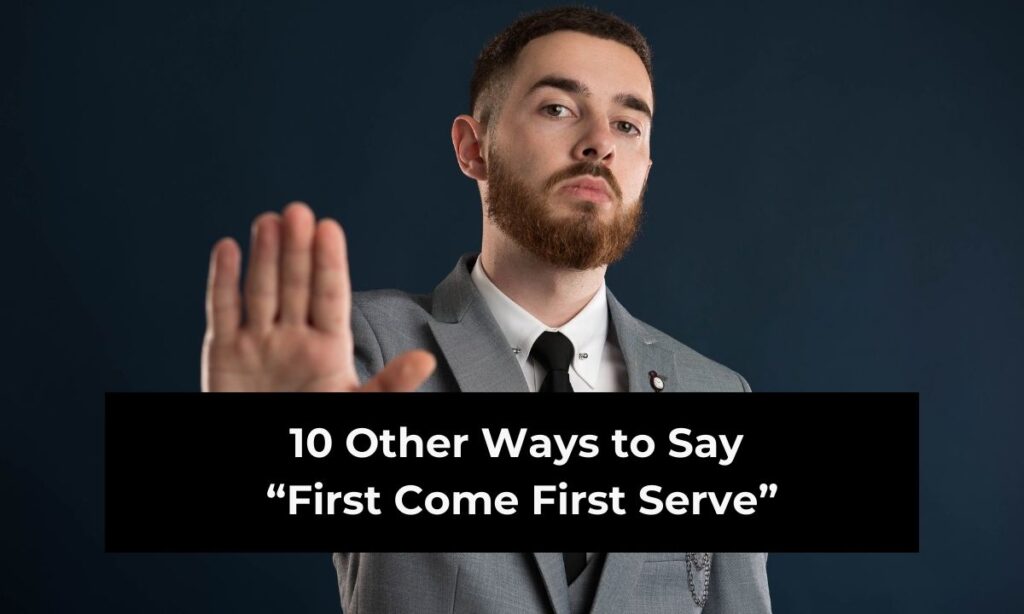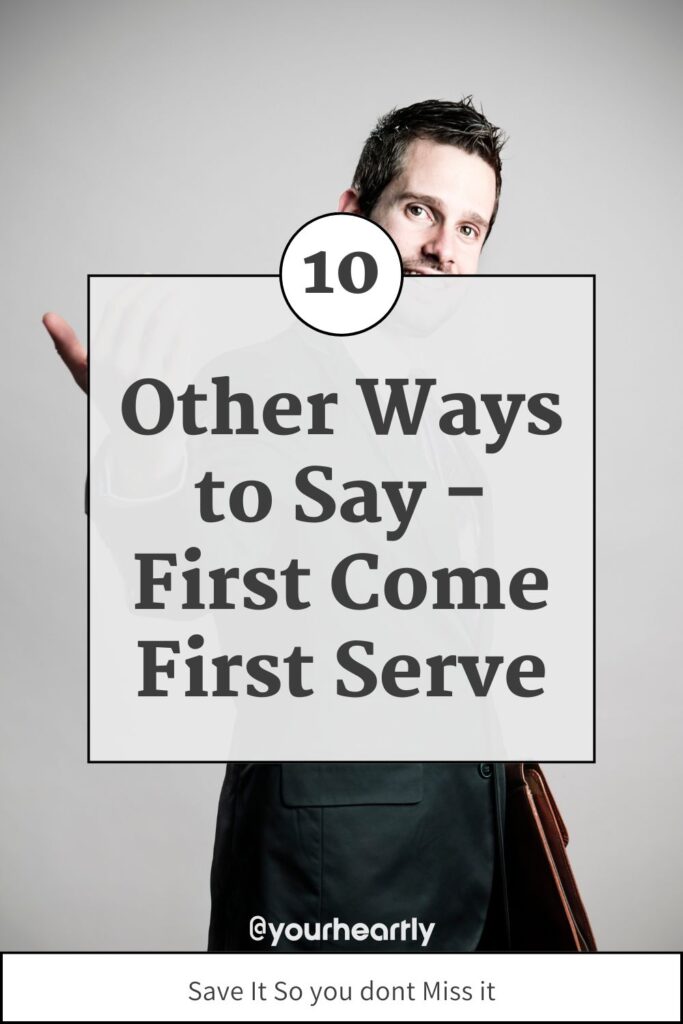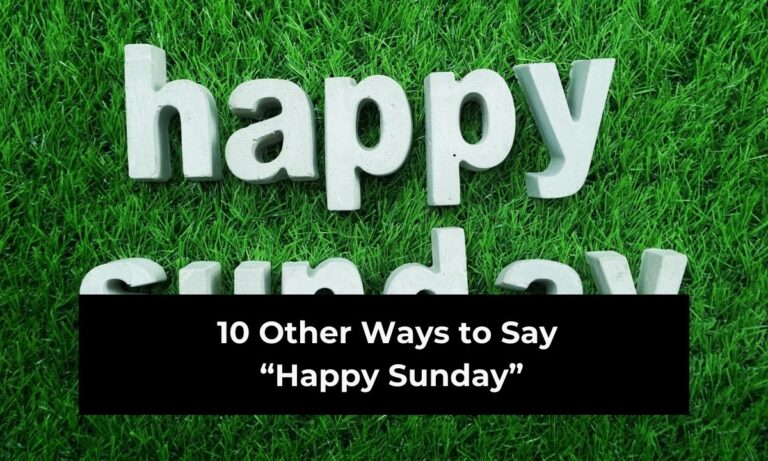Have you ever planned an event, launched a sale, or opened up limited spots for something exciting, only to wonder how to tell people that space is limited? You might automatically think of using the phrase “first come, first serve.” It’s short, familiar, and gets the point across. But sometimes, you need fresh language that feels more polished, professional, or creative—especially if you want to make your message stand out.
The phrase “first come, first serve” can sometimes sound too casual or even confusing. Technically, the grammatically correct version is “first come, first served,” but most people still use the common variation. Either way, you may want to avoid it in certain settings because it doesn’t always fit your tone or audience. For example, if you’re promoting a luxury product, running a professional workshop, or designing marketing materials, you probably want something that feels more engaging or polished.

That’s where alternatives come in handy. By swapping out the standard phrase for something more creative, you can still communicate urgency while matching your brand voice. Think about phrases like “limited spots available,” “while supplies last,” or “on a rolling basis.” These phrases sound more intentional, create excitement, and encourage people to act quickly without feeling like they’re being rushed.
In this article, we’ll explore 10 other ways to say “first come, first serve.” Each phrase comes with an explanation, examples, and tips on how you can use it in everyday communication, marketing, or event planning. Whether you’re a business owner, a teacher, an event organizer, or just someone trying to communicate clearly, you’ll find plenty of ideas to replace the old go-to.

So, let’s dive in and discover the best alternatives to keep your language sharp, persuasive, and memorable.
1. “Limited Spots Available”
When you want to emphasize exclusivity and urgency, “limited spots available” is one of the strongest alternatives. It instantly tells people that the opportunity won’t last forever and that they need to act quickly to secure their place. Unlike “first come, first serve,” this phrase feels more professional and polished.
For example, if you’re hosting a small workshop or retreat, saying “limited spots available” signals that your event is intentionally designed for a select group. It conveys scarcity without sounding rushed or unorganized. People also respond well to the idea of exclusivity—it makes them feel like being part of your offering is special.
This phrase also works beautifully in marketing. Picture an email campaign announcing a product launch: “Our new collection drops Friday—limited spots available for early access.” Right away, your audience knows they need to sign up or make a purchase quickly.
The great thing about “limited spots available” is its versatility. You can use it for physical events, online programs, sales, or even giveaways. It creates just enough urgency to motivate action while still keeping the tone warm and inviting.
Whenever you want to balance professionalism with excitement, this phrase is a reliable choice.
2. “While Supplies Last”
If you’re running a sale or offering something with a clear end point, “while supplies last” is a perfect fit. Unlike “first come, first serve,” this phrase highlights the tangible reality: once the inventory is gone, the opportunity is gone too.
This works particularly well in retail, e-commerce, and promotional campaigns. Imagine posting about a limited edition product: “Available in three colors—get yours while supplies last.” The phrasing makes your audience feel a sense of urgency without making the opportunity sound rushed.
It’s also effective in food service or seasonal offerings. A café might post: “Pumpkin spice latte available through November—while supplies last.” This creates buzz and encourages repeat customers who don’t want to miss out.
The phrase feels natural, familiar, and approachable, making it easy for people to understand. It subtly nudges them into action, reminding them that waiting too long could mean missing out.
If you want a phrase that’s easy to apply and communicates scarcity clearly, “while supplies last” is an excellent alternative.
3. “Spaces Are Filling Fast”
This phrase adds a sense of urgency with a hint of momentum. Instead of simply saying spots are limited, you’re letting people know that others are already taking action—and they might miss out if they don’t move quickly.
For instance, if you’re promoting a yoga class, you could say: “Our weekend retreat is open for registration—spaces are filling fast.” Not only does this make potential attendees feel like they need to secure their place, but it also builds excitement. It shows that the event is popular and worth attending.
“Spaces are filling fast” works especially well in contexts where you want to highlight demand. It creates a sense of social proof—if others are signing up quickly, the opportunity must be valuable.
In marketing, this phrase pairs beautifully with countdowns, early bird pricing, or exclusive bonuses. You could send an email subject line like: “Hurry—spaces are filling fast for our summer program.”
When you want to create urgency that feels lively and energetic, this alternative strikes the right balance.
4. “Act Fast”
Sometimes, simple is best. “Act fast” is short, punchy, and direct. It doesn’t waste words—it tells your audience exactly what to do.
This phrase is often used in advertising or promotional campaigns where speed is the most important factor. For example: “Flash sale ends at midnight—act fast!” or “Act fast to claim your bonus gift.” The direct call to action leaves no room for hesitation.
“Act fast” works well when paired with deadlines, discounts, or flash sales. It communicates urgency in a way that feels energetic rather than desperate. Because of its brevity, it’s especially effective in headlines, email subject lines, or social media posts where space is limited.
While “act fast” might not be the most formal choice, it works beautifully for casual, engaging communication. If your brand voice is upbeat and energetic, this phrase can fit seamlessly.
Whenever you want to create a sense of immediacy with just two words, “act fast” is your go-to option.
5. “On a Rolling Basis”
If you’re running applications, memberships, or opportunities that don’t have a set deadline, “on a rolling basis” is a strong and professional alternative. Unlike “first come, first serve,” this phrase communicates that you’ll review or accept submissions as they arrive.
This is commonly used in education, job postings, and program registrations. For example: “Applications for our mentorship program will be considered on a rolling basis.” It gives people clarity about the process without pressuring them unnecessarily.
The tone of “on a rolling basis” is calm, organized, and professional. It works particularly well in formal communication where you want to avoid casual phrases. It tells people that there’s no fixed cutoff date but also suggests they shouldn’t delay, since opportunities may fill up as submissions come in.
If you want to replace “first come, first serve” in a context that requires professionalism and clarity, this phrase is one of the best alternatives.
6. “Early Bird Gets the Spot”
This playful twist on the classic “early bird gets the worm” keeps the sense of urgency while sounding friendly and engaging. It’s a great way to encourage people to act quickly without using overly formal language.
For example, if you’re hosting a summer camp or offering discounted tickets, you might say: “Sign up today—the early bird gets the spot.” It conveys the idea that those who act first benefit the most, but it does so in a way that feels approachable.
This phrase works especially well for events, workshops, or promotions targeting a wide audience. It feels creative and lighthearted, making it more memorable than the standard phrase.
If you want your messaging to feel fun while still highlighting urgency, “early bird gets the spot” is a clever alternative that your audience is likely to remember.
7. “Priority Given to Early Respondents”
For situations that require a professional tone, this phrase is excellent. It clearly communicates that those who respond early will receive preference without sounding overly casual.
For instance, if you’re running a scholarship application, internship program, or housing opportunity, you could say: “Priority given to early respondents.” This strikes a balance between fairness and urgency, encouraging people to take action while maintaining a respectful tone.
This phrase also works in customer service or membership situations. You might write: “Priority will be given to early sign-ups for our new membership tier.” It conveys that you value timeliness without dismissing those who may act later.
When you want to sound organized, fair, and professional, “priority given to early respondents” is a strong replacement for “first come, first serve.”
8. “Available Until Gone”
This phrase is a straightforward way to communicate scarcity while keeping the tone approachable. It’s similar to “while supplies last,” but with an even more casual, conversational feel.
For example: “Our exclusive candle collection is available until gone.” This creates a friendly sense of urgency without sounding too pushy. It lets your audience know there’s no restock once items sell out, so they need to act quickly.
“Available until gone” works beautifully in marketing for limited edition products, seasonal releases, or small-batch items. It’s simple, easy to understand, and feels authentic.
If you want a phrase that combines clarity with warmth, this is an excellent alternative.
9. “Secure Your Spot Today”
This alternative emphasizes action while making your audience feel like they’re claiming something valuable. It works especially well for events, programs, or opportunities where space is limited.
For instance: “Join our fall retreat—secure your spot today before spaces run out.” The phrase highlights exclusivity and motivates people to act quickly while keeping the tone encouraging.
This phrase also works well in sales and marketing contexts. For example: “Secure your spot today for early access to our holiday collection.” It frames the opportunity as something to be claimed rather than something people might miss.
“Secure your spot today” is a strong replacement when you want your language to feel motivating, reassuring, and clear.
10. “Reservations Required”
Sometimes, the best way to replace “first come, first serve” is by adding structure. “Reservations required” communicates that people need to take action ahead of time in order to participate.
This phrase is especially useful for restaurants, classes, or events where you want to avoid walk-ins or last-minute sign-ups. For example: “Join us for our wine tasting event—reservations required.” It not only creates urgency but also communicates expectations clearly.
Unlike some of the other alternatives, “reservations required” shifts the focus from scarcity to preparation. It signals that you’re organized and intentional, which can add a sense of professionalism to your message.
If you want to encourage commitment while replacing “first come, first serve,” this phrase is one of the best options.
Conclusion
When you want to express urgency or scarcity, you don’t have to rely on the tired phrase “first come, first serve.” There are plenty of alternatives that can sound more professional, more engaging, or more aligned with your brand. From straightforward options like “while supplies last” to more creative twists like “early bird gets the spot,” the words you choose can set the tone for your entire message.
The key is to match the phrase to your audience and your goals. If you’re running a professional program, use “on a rolling basis” or “priority given to early respondents.” If you’re promoting a sale or event, try “spaces are filling fast” or “secure your spot today.” And if you want something simple but effective, “act fast” always works.
Language shapes how people perceive your message. By choosing one of these alternatives, you not only communicate urgency—you also create an experience that feels intentional, inviting, and aligned with your purpose.
Next time you’re tempted to use “first come, first serve,” swap it for one of these options to keep your communication fresh, persuasive, and memorable.
FAQs
1. Why should I avoid using “first come, first serve”?
It can sound too casual or even confusing. The grammatically correct form is “first come, first served,” but using alternatives often sounds more polished and professional.
2. What’s the best alternative for professional settings?
Phrases like “on a rolling basis” or “priority given to early respondents” work best in formal or professional contexts.
3. Which phrase works well for sales or promotions?
“While supplies last,” “spaces are filling fast,” and “act fast” are excellent choices for marketing campaigns.
4. Can I use these alternatives in everyday conversation?
Yes! Many of these phrases, like “available until gone” or “secure your spot today,” can be used casually in day-to-day communication.
5. How do I choose the right phrase for my situation?
Think about your audience, your tone, and the level of urgency you want to create. Pick a phrase that feels natural and matches your goal.





